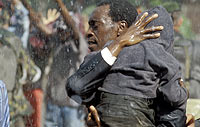Berkeleyan
At the movies with Weinstein and Stover
Thumbs up for Hotel Rwanda and No Manís Land
![]()
10 February 2005
Harvey Weinstein: There are two recent movies dramatizing human-rights issues that are really quite amazing. One is the Bosnian film No Manís Land: Bosnia and Herzegovina, directed by Danis Tanovic, which won the Academy Award in 2002 for the best foreign-language film. We do an analysis of it in our book. Itís the story of a Bosnian Serb and a Bosnian Muslim in a trench, caught between the different forces ó with the buddy of one of them lying on a land mine; if he moves, everything will explode.
 Don Cheadle is up for an Academy Award for his portrayal in Hotel Rwanda of Paul Rusesabagina, a hotel manager who sheltered more than 1,200 refugees from certain death in the Rwandan genocide. (United Artists Films) |
We did a 10-year anniversary of the Rwandan genocide here on campus last year. There was very little interest; maybe 40 people came, although we had a panel and it was well-publicized. But Hotel Rwanda has finally galvanized interest ó showing the power of the media to awaken memory and a sense of values. But I think also that whatís happened with torture, whatís happened with the Iraq war, has raised questions in peopleís minds: ďWhat is justice? What is fair? What is terror?Ē
Eric Stover: And what should be our response to atrocities and massive violations of human rights? Have we decided that international instruments like the International Convention Against Torture and the 1949 Geneva Accords ó which were so painstakingly put together since World War II ó are irrelevant and quaint? Are they agreements that we donít want to follow any longer?
With Hotel Rwanda, Terry George gives us an artistic vision of a true story involving one hotel in the Rwandan capital of Kigali, and through the events that take place there we come to understand multiple aspects of the genocide. What is remarkable is how George unabashedly explains to the viewer why the West refused to intervene to stop the genocide. Itís the scene where the U.N. general, played by Nick Nolte, says to the character played by Don Cheadle, ďDonít you realize why the world is not going to stop this? Itís because of who you are ó black Africans.Ē That is one of the most powerful moments in the film, and an important statement that needs to be said and acknowledged.
HW: Nolte plays General Romťo Dallaire, former commander of the U.N. forces in Rwanda. Weíre bringing him here March 6 to our human-rights colloquium. His book, Shake Hands With the Devil, is so terrifying. Basically he said he shook hands with the devil in Rwanda. I could only read 20 pages at a time, because I felt such rage at the inaction, the bureaucracy, of the United Nations, the inability to care that hundreds of thousands were dying. Dallaireís life was virtually destroyed by this. He had a nervous breakdown; he had to leave the Canadian military; he tried to kill himself.
For information on the Human Rights Centerís spring 2005 colloquium series, see hrcberkeley.org or call 642-0965. For background on Dallaire in Amnesty Internationalís online magazine, see amnestyusa.org/magazine/general_and_genocide.html.

